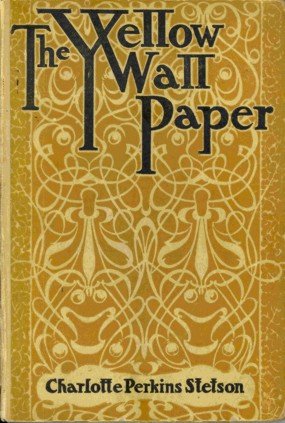Female Hysteria and ‘The Yellow Wallpaper’ #TWBBookClub
At the @thewritersblock we have been reading “The Yellow Wallpaper” for the first month of #book-club (see original post here). A short story first published in 1892, written by Charlotte Perkins Gilman, available on Project Gutenberg.
It’s different reading this story the second time. Now I am reading it with the intention of the #TWBBookClub: as an author, looking at how something is written in combination with how it affects you as a reader. It’s not that I don’t care about what happens, but I’m much more interested in why it happens and, most of all, how. How did Gilman make it possible to make me feel for this woman?

The use of first-deep-POV
This month the accompanying questions were focussing on the point of view (POV) that is used in the story. It’s a so-called ‘deep-POV’, and even a first-person POV. So what we read are the thoughts of the main protagonist. But she is also writing. At least, the cuts in time are explained that way… She explicitly mentions she isn’t supposed to be writing, and that is why we don’t get to hear her thoughts for two weeks. Yet what we read is not a classic diary format. No ‘Dear Diary’, she doesn’t seem to address anyone in particular. She needs a place to tell what she thinks, without getting a judgment from someone. And she seems to find this in her writing.
This specific POV works very well, because it makes you experience something which is most of all only experienced inside the mind of someone else. Normally mental illness is diagnosed by assessing the outer cues: behaviour, what people communicate. But by getting into someone’s head, you really get a clearer view of the processes that are going on.
The role of the husband
Another member of the #TWBBookClub, @alheath, mentioned in a review on “The Yellow Wallpaper” (read it here on Steemit) that it would also be interesting to read the same story from the husband’s point of view. It would give us more insight into how the people around someone with mental health issues feel and think. And even though I agree, in this case I don’t think it would have given us as much as we have now. And this has to do with what I think is actually going on in this book.

Written in 1892, this book must have been a sensation in its time. But even now, it brings us closer to something which we now maybe have a hard time understanding. I’m referring to female hysteria. It’s a term that the American Psychiatric Association--the leading organization with regard to diagnosing mental health--only dropped in the 1950s, its remnant remaining intact in their ‘diagnostic bible’ as ‘hysterical neurosis’ until 1980. And even though it is not an official diagnosis anymore, ‘hysteria’ is still a term that is used for women who have an inexplicable restlessness. This restlessness, men decided, had to do with their wombs, and having children would fix it.
Back to the book. John, the husband, is also a physician. He has declared there was nothing really the matter with her, except “a slight hysterical tendency”. The protagonist brings up a lot of what John tells her, always as truth. He tells her to do this or that, and she tries to comply. He tells her not to do anything, even though she tells us she feels that she would be instantly cured if she would have something to do. She seems extremely bored, unable to find rest, anxious because of not knowing what to do with herself. She likes to write, but gets tired from having to hide from her husband the fact she writes. She tells us she would love to have someone to talk to about her writing, to help her when she gets stuck. Oh, how well can I recognise that feeling.
It is the husband that decides for her--about her condition, about what is good for her, even about what to think about. Maybe this wasn’t exceptional for a woman living in 1892, and it is still the case that the life of the woman is often defined and decided by her male companion. Yet it is hardly surprising that the woman in this story fails to ‘get better’.
Some indications of the power of John’s judgments over the main protagonist:
“He said that I was letting it get the better of me, and that nothing was worse for a nervous patient than to give way to such fancies.”
“He says that with my imaginative power and habit of story-making a nervous weakness like mine is sure to lead to all manner of excited fancies, and that I ought to use my will and good sense to check the tendency. So I try.”
Response to external judgments
But even without aspect of the hysterics or the neurosis, this is a powerful book. For how often do we try to tell someone how we feel and get a response that makes us wither away?
“I am a doctor, dear, and I know.“
And it is this moment, when the main protagonist tells us she has decided no longer to talk about how she feels to her husband because he doesn’t understand her, that she slides into what we would consider psychosis--into a world that is cut off from the real as we share in its experience. No longer are there meaningful interactions between her and other people. The obsession takes over.
The main strength of the first-person deep POV in this story, is how all this can be said without actually saying as much. The character arc is central to it all, and these small hints at what must have been a huge social critique in 1893 can be read between the lines. Shifting the POV to the husband would never have been able to show this critique.

Hey, you've just been upvoted by the Steemit Book Project! The project exists to help make books more available to the world and to promote book-related content on Steemit.
You can read more about the project here. If you often write book related posts, head over to our Discord server (https://discord.gg/h93nHMu) and pop your book post links in the #curation-requests channel.
Hope you have a good day and find time to read a book!
I love what you are doing and have now followed you. :)
I would venture to say this book was probably borderline scandalous and surprised it wasn't censored.